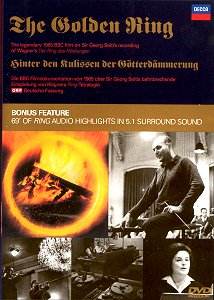When it first appeared, we learned some amazing things
from this great documentary: how the Vienna traffic was halted for soft
passages of music in the Ring recordings; how producer John Culshaw
persuaded Sir Georg Solti to speed up proceedings at Siegfied’s funeral;
and, most scandalous of all, that Dietrich Fischer-Dieskau was a smoker!
Shock, horror, wouldn’t have believed it if I hadn’t see it with … etc.
Equally fascinating, on a more serious level, is the sight of these
engineers back in the dear dead days of the 1960s, editing tapes by
hand. If you think of the musical and financial responsibility carried
by those nonchalant strokes with the blade, the mind really does begin
to boggle, even more so if you’ve ever tried it yourself!
This is a truly wonderful film, packed with drama,
humour and information. The drama arises out of the power of the music
and of the personalities involved in creating it, principally Solti,
but also Culshaw, who presides at his editing console with all the charismatic
sang-froid of a World War 2 Spitfire pilot, cravat and all. Solti, relatively
young at the time the film was made, is a revelation. His dynamism,
dedication and unflagging energy are legendary; less so are the pharmaceuticals
that he used in order to keep himself going, laid out for all to see
on his hotel bedside table.
The humour is constantly breaking through, most notably
with the stunt involving Birgit Nilsson, Brünnhilde, and a large
stallion – you need to see it really, but it’s not as bad as it sounds
(this is family viewing). Less intentionally funny are the two Decca
chappies responsible for organising the complex schedules (long before
the days of computers, so they probably worked just fine). Their little
scenes reminded me of the two Englishmen in The Lady Vanishes, who,
whatever the mayhem going on around them, really only want to find out
the score in the test match back home.
The film is followed by generous audio highlights from
the Decca Ring. I say ‘generous’, but it’s not really a very
good idea – surely most people who want a DVD on this subject will already
have a complete Ring on disc? In any case, the enhanced sound
("Dolby Digital 5.1 Surround Sound") seemed to me less immediate
than that on the CD transfers published a few years back – some of that
elemental quality seems to have been lost.
Just as the video of the making of Bernstein’s ‘definitive’
West Side Story recording was an unique insight into state-of-the-art
recording techniques in the mid-1980s, so this film chronicles, in an
absorbing and entertaining way, the situation as it was some twenty
years earlier. Humphrey Burton, whom we have to thank for so many great
musical documentaries, produced a classic here, which Wagner enthusiasts,
as well as all those simply interested in the development of recording,
will enjoy enormously.
Gwyn Parry-Jones


